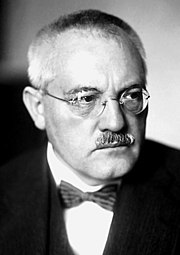Carl Bosch
| Carl Bosch | |
|---|---|
 |
|
| Born |
27 August 1874 Cologne, Germany |
| Died | 26 April 1940 (aged 65) Heidelberg, Germany |
| Nationality | German |
| Fields | Chemistry |
| Institutions | BASF, IG Farben |
| Alma mater | Technical University of Berlin |
| Known for | Haber–Bosch process |
| Notable awards |
|
Carl Bosch (27 August 1874 – 26 April 1940) was a German chemist and engineer and Nobel laureate in chemistry. He was a pioneer in the field of high-pressure industrial chemistry and founder of IG Farben, at one point the world's largest chemical company.
Carl Bosch was born in Cologne, Germany to a successful gas and plumbing supplier. His uncle Robert Bosch pioneered the development of the spark plug. Carl, trying to decide between a career in metallurgy or chemistry, studied at the Königlich Technische Hochschule Charlottenburg (now the Technical University of Berlin) and the University of Leipzig from 1892–1898.
Carl Bosch attended the University of Leipzig, and this is where he studied under Johannes Wislicenus, and he obtained his doctorate in 1898 for research in organic chemistry. After he left In 1899 he took an entry level job at BASF, then Germany's largest chemical and dye firm. From 1909 until 1913 he transformed Fritz Haber's tabletop demonstration of a method to fix nitrogen using high pressure chemistry into an important industrial process to produce megatons of fertilizer and explosives. The fully developed system is called the Haber–Bosch process. His contribution was to make this process work on a large industrial scale. To do this, he had to construct a plant and equipment that would function effectively under high gas pressures and high temperatures. There were many more obstacles as well, such as discovering a practical catalyst, designing large compressors and safe high-pressure furnaces. A means was needed to provide pure hydrogen gas in quantity as the . Also, cheap and safe means had to be developed to clean and process the product ammonia. The first full-scale Haber-Bosch plant was erected in Oppau, Germany, now part of Ludwigshafen. With the process complete he was able to synthesize large amounts of ammonia, which was available for the industrial and agricultural fields. In fact, this production has increased the agricultural yields throughout the world.
...
Wikipedia
